
|
What Are Equine Assisted Services?
|
| |
Horses thrill us as athletes, but they are also amazing teachers, companions and healers.
Throughout history, horses have been involved with humans in many roles. Today, horses continue to bring joy to young and old alike and help make those with the deepest of wounds whole again. Equine Assisted Services (EAS) allow people with physical, cognitive, behavioral or emotional challenges to find strength, healing and independence through the power and connection with the horse.
Equine Assisted Therapies are therapies in which licensed health professionals in tandem with trained and certified equine specialists partner with horses to achieve client treatment goals.
Equine Assisted Psychotherapy
A powerful alternative to "Talk Therapy"
Equine Assisted Psychotherapy is an experiential interactive process to address psychotherapy goals set forth by the mental health professional and the client.
Offering an interactive, hands-on approach with the horses, clients are given the space to project and analyze their situations, make connections, and find their own solutions. Since the solutions are personally experienced in conjunction with intellectual understanding, they tend to be deeper, more profound, and longer lasting. The horses become a part of the client's narrative and their path to healing.
• PTSD affects 7.7 million adults (3.5% of the U.S. population)
• 22 Veterans commit suicide every day
Video courtesy of EQUUS Foundation Guardian, The Equus Effect
Producer/Director: CB Wismar | Director of Photography: William Benjamin Willis
The Invisible Girl: From Darkness to Light
Imagine leading a life filled with so much anxiety and past trauma that you only feel safe by hiding from the world. But you're young and you have to rely on others for housing, food and care. Since you can't avoid everyone, you create a very special way to hide.
You carefully arrange your long hair so it keeps your face covered every time you leave your room - hiding your face, and your expressions and feelings. You keep this shield up at all times, vowing that no one will ever again hurt you.
Imagine a wild Mustang who was enjoying a life of freedom until she was violently rounded up, separated from her herd. She was young when she was captured and sent away to a foreign place, with a mean human in charge. The Mustang worked hard every day, yet received little to eat and poor living conditions in return. She was beaten often for not understanding her new jobs, and she became scared and anxious.
The Mustang became so fearful of humans that she would quickly hide if anyone approached. The Mustang decided she could only feel safe if she stayed out of reach, hiding from the humans. She hid her eyes, and her expressions and feelings, behind a long forelock of dark hair, vowing that no one will ever again hurt her.
Faith was one of several Mustangs fostered by Project Horse until they could secure safe transport to the Black Hills Wild Horse Sanctuary in South Dakota, where they live now until the end of their days.
|
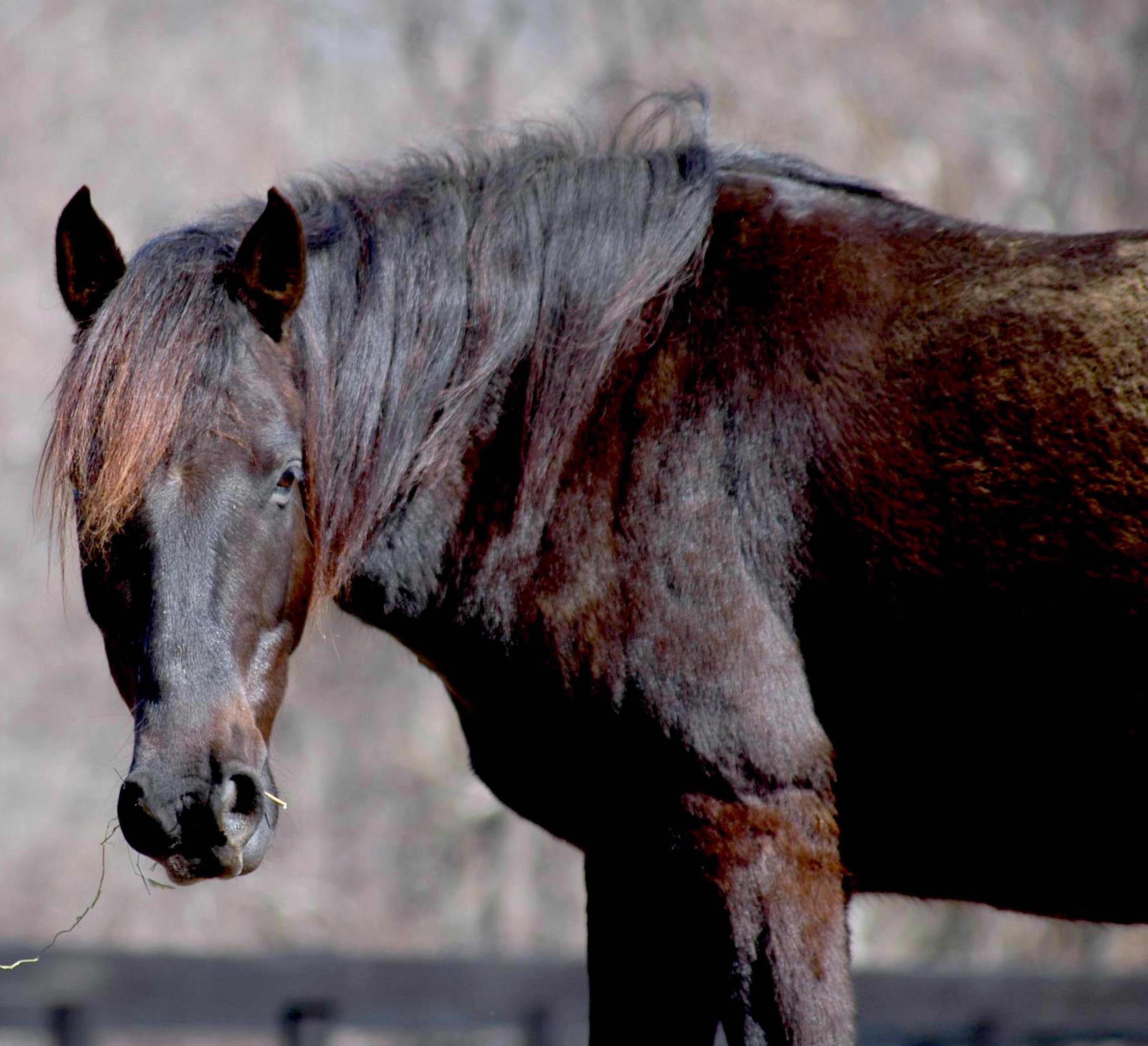
Faith
Photo @Project Horse Empowerment Center & Mustang & Burro Freedom Foundation
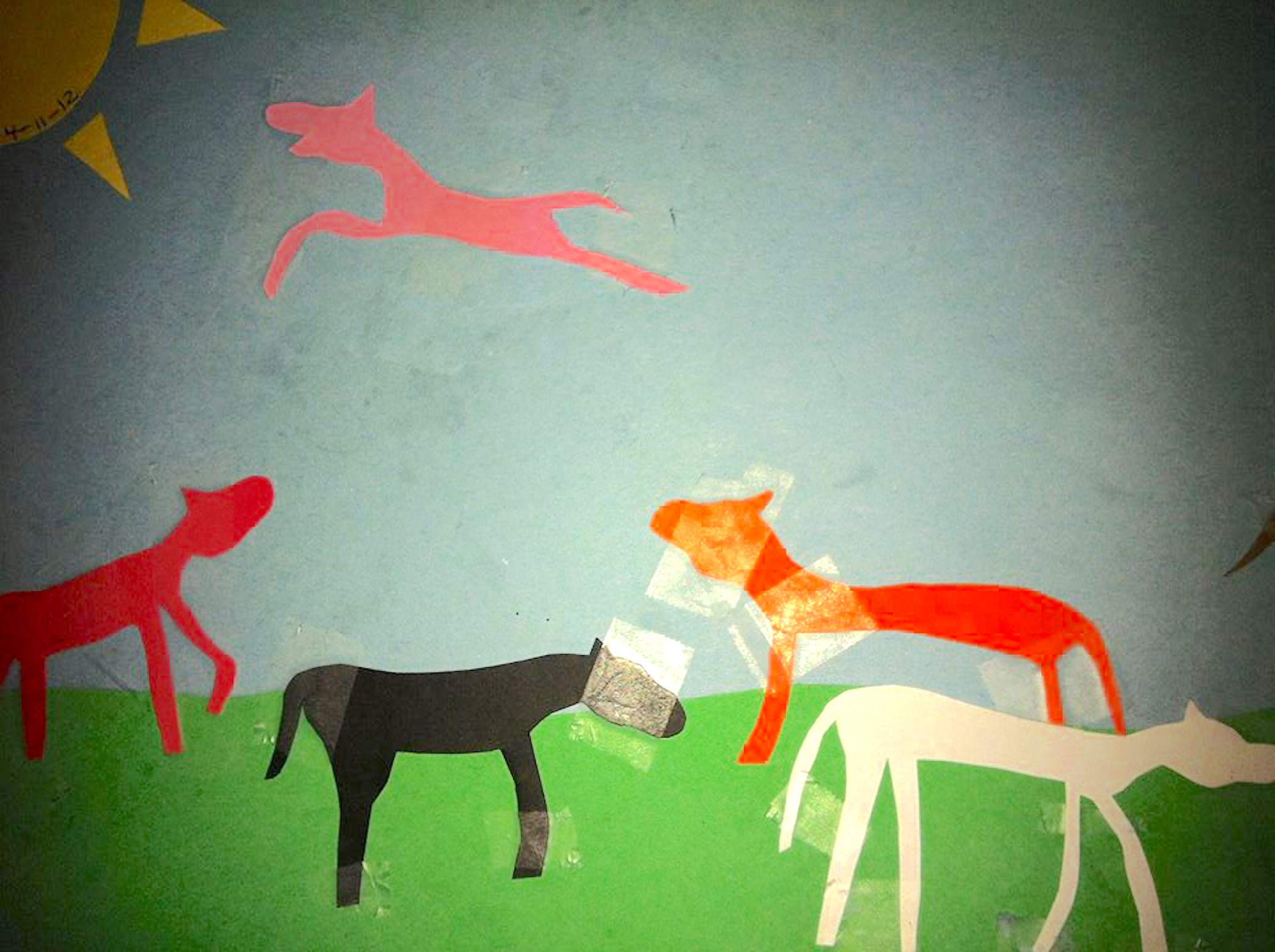
Photo @Project Horse Empowerment Center A beautiful testament to a frightened mustang drawn by an invisible girl coming together so their mutual healing could begin.
|
Imagine these two wounded souls coming together. Listen to the full story in the video that follows shared by Darcy Woessner, Executive Director, Project Horse Empowerment Center.
Video courtesy of Project Horse Empowerment Center, EQUUS Foundation Guardian

Photo @Brook Hill Farm
|
Angry Meets Angry
Horses react and respond to people almost like a large biofeedback machine. They are extremely sensitive and view people as predators and view themselves as prey.
All Equine Assisted Psychotherapy is done on the ground with the horses front and center, deliberately unhindered and allowed to interact with the client as they wish.
|
Meet Anna, an angry teen, who suffered sexual abuse while in the care of a trusted adult when she was young. Recently she had trouble expressing herself to her male principal about needing extra help with an assignment. She quickly became frustrated, then combative and yelling, saying no one will help her.
Her mother was called in, since similar incidents had happened during the school year. In consultation with the principal, the school psychologist and Anna's mother, they decided that Anna would benefit from therapy, to help her safely process the traumatic events of her childhood. Since Anna flatly refused to see a therapist in an office, Anna was referred to a licensed therapist at a local Equine Assisted Service center.
|

Photo @Brook Hill Farm |
Anna began by interacting with an older horse who had been rescued from an abusive owner and could no longer be ridden because of his past mistreatment. In order to build a friendship with Malcolm, Anna had to help Malcolm overcome his fear response when presented with new challenges - which, in one situation, was a a crinkly blue tarp in his paddock. With Anna at his side, Malcolm eventually reached out his long nose to sniff the tarp. To Malcolm's surprise, the tarp did not attack him. The next week, Anna got Malcolm to walk across the tarp.
Throughout this process with Malcolm, Anna was learning the same method to deal with her own fear, which she admitted that she hid in anger, hoping everyone would leave her alone. As Anna's fear diminished, so did her anger. Over time, with Malcolm standing at her side, Anna talked and was able to work through the traumas of her past.
|
Hippotherapy
Physical, occupational, or speech and language therapy treatment strategies that utilize equine movement (known as Hippotherapy) is conducted by licensed physical therapists, occupational therapists, and speech/language pathologists to address impairments, functional limitation and disabilities in patients with neuro-motor and sensory dysfunction.
The motion of the horse provides sensory feedback, aids with muscle development as the rider has to adjust their body to stay in the saddle. The licensed professionals work with a trained horse handler to provide the client with the best possible outcome.
|
When the horse walks, the horse moves the rider's body in a manner similar to the human gait: front to front, and side to side.
|
|
|
Alexa enrolled in an equine therapy program to work with her physical therapist, after a car accident when she was 15.
Alexa's goal was to walk again. Her therapy session began by mounting a horse with a special lift.
Once she was on the horse, she left her wheelchair behind, and was able to join a new group of friends, without the stigma of her wheel chair.
|

Photo @Brook Hill Farm |
According to the American Speech-Language Hearing Association (ASHA), there are five areas in which speech-language pathologists (SLPs) help treat children and adults: Speech difficulties, Language difficulties, Social communication difficulties, Cognitive-communication difficulties, and Swallowing difficulties (dysphagia).
Samuel is working with an SLP for speech difficulties. Speech difficulties occur when a person is unable to produce speech sounds correctly or fluently, or when a person has problems with their voice or resonance. The production of a single syllable requires the participation of 8-10 body parts and the coordinated action of 70+ muscles!
The SLP works one on one with a client to improve production of speech sounds and words. The consistent, repetitive, and rhythmical motion of the horse stimulates clients to put their words and thoughts together to communicate more effectively.
|
One of the main benefits of equine therapy programs for SLPs and their clients is the many opportunities to practice communication and language, from talking about caring for the horse to giving direct instructions to the horse itself!
|
|
Madison has trouble with fine motor skills, picking small things up and putting them in their proper place. She has been resistant to working with her occupational therapist in a clinical setting. Madison loves horses, and she likes to put the rings on the noodle.
Performing other tasks while seated on horseback can further improve her fine motor skills and motor planning, as she has to constantly adjust to remain upright. Once learned, these skills can be help to promote her independence and functional ability to help with her with her daily tasks.
|
Why is it called Hippotherapy?
The word "hippotherapy" comes from the greek "hippos" meaning horse and "therapy" meaning care. Thus, hippotherapy is partnering with the horse to achieve therapeutic rather than equestrian goals.
Therapeutic Horsemanship are activities that empower individuals with horsemanship skills (such as riding, driving, vaulting, or general groundwork)
Therapeutic Horsemanship activities have been adapted to the ability/disability of the people participating in the services are conducted by specially trained instructors with the purpose of contributing positively to the participant's cognitive, physical, emotional and social well-being.
|
Riding
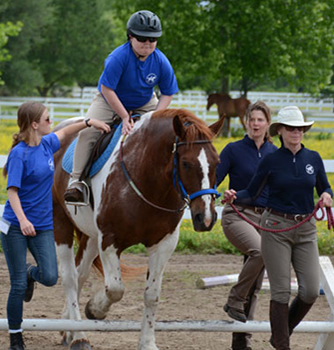
Photo @Charleston Area Therapeutic Riding
Where hippotherapy is focused on how the horse's movement can improve an individual's sensory processing, therapeutic riding incorporates both the physical and emotional benefits of learning to ride a horse and the connection established between the horse and the rider.
Austin is a young boy who wanted to ride a horse, but the local riding stable was not able to accommodate him because of his disabilities. At a therapeutic riding center, instructors are trained to work with people with disabilities.
|
Groundwork
The physical and emotional rewards also come from the interaction with the horse on the ground including activities like grooming, bathing, and tacking up the horse.
|
|
|
|
Vaulting
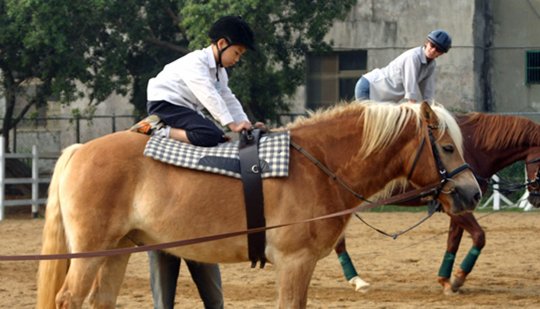
Photo @PATH Intl. |
Driving
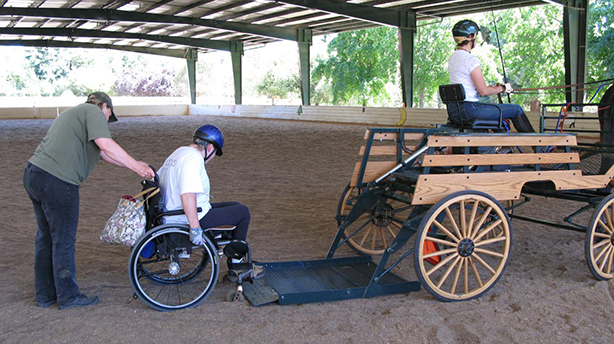
Photo @NCEFT |
Equine Assisted Learning is an experiential learning approach involving the interaction between the horse and an individual to promote the development of life skills that aid in academic achievement, personal growth and exploration, or professional development.
Academic Learning
Equine Assisted Academic Learning programs involve utilizing an educational curriculum designed by an educator who, with an appropriately credentialed equine professional, incoporates the horse to address academic goals as well as critical life skills, such as trust, respect, honesty, and communications.
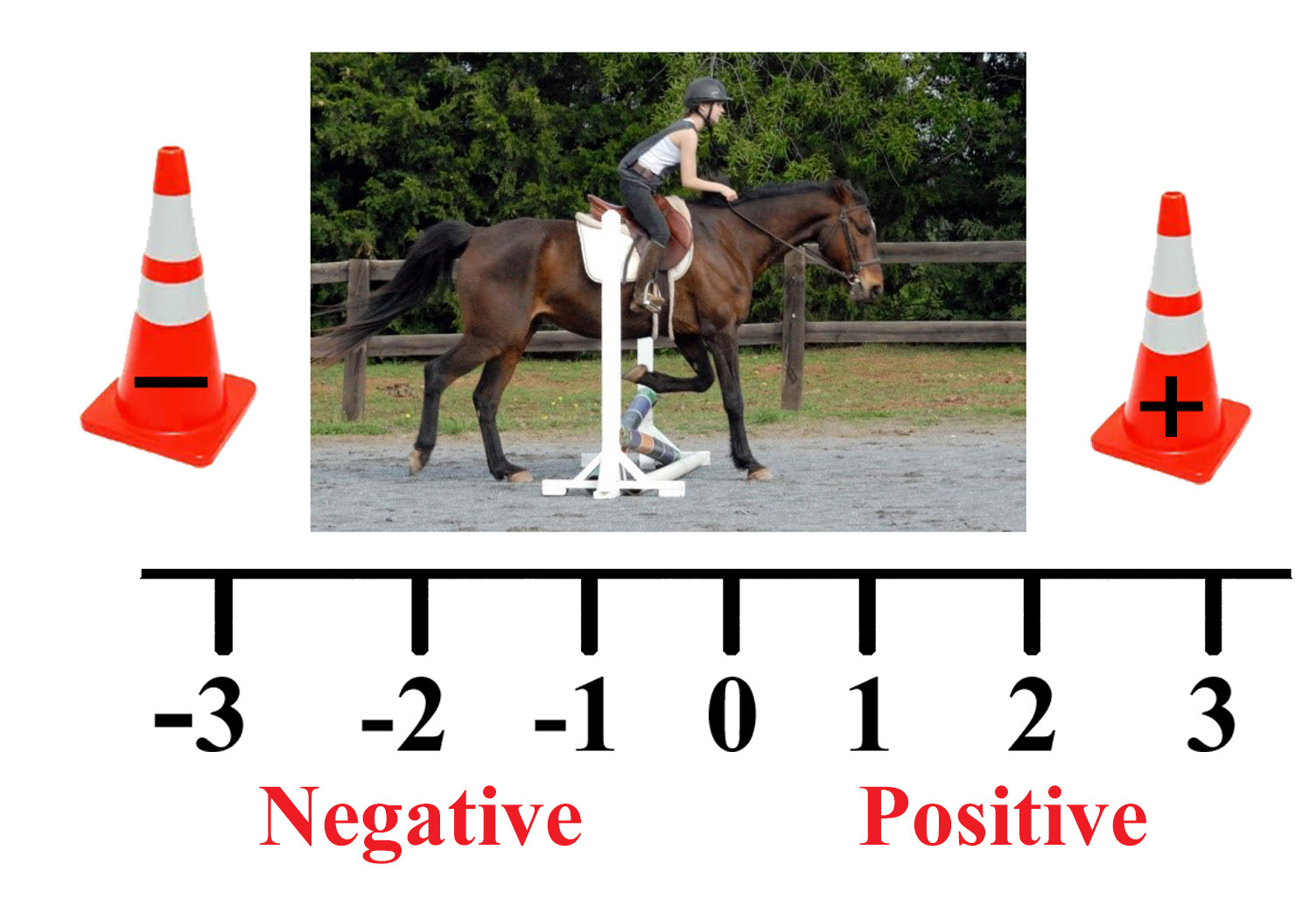
Photo @Brook Hill Farm |
Jordan is having trouble learning the concept of absolute value, and is struggling with her homework assignment. During her jumping lesson, Jordan is learning to count strides. Knowing the number of strides your horse will take between jumps is important in ensuring that your jumping rounds will flow more smoothly.
Jordan counts how many strides there are from the negative cone (-3) to the cross-rail (0) and then from the cross-rail to the positive cone (3). There are 3 strides between each cone and cross-rail. Jordan brings this kinetic experience back into the classroom and is able to successfully complete her assignment.
|
Guided by a licensed educator and an equine specialist, the session with the horse is specifically designed to enable students to learn and break down the skills needed to achieve their academic objectives.
Self-improvement, Wellness, Team Building, and/or Personal or Professional Coaching
These equine-interactive sessions are conducted by an educator, mental health professional, such as a therapist, counselor, clinical social worker, or coach in tandem with an individual experienced in equine handling and equine behavior to ensure the safety of the coach, client, and the equine.
|
|
John is the manager of a team of five in an office that specializes in solving human resource problems. One team member, Suzy, is left out of most discussions, and John knows she has a lot to offer.
When speaking with her, Suzy tells him she feels she does not really fit in, is very self-conscious about her weight, and prefers not to draw attention to herself.
|
John decides to bring his team to participate in a coaching session at a nearby equine charity offering therapeutic activities. The licensed professional sets up an exercise where the team has to move the horse through a pattern without touching the horse.
At first the other four team-mates try to take the lead. After much laughter and failure at getting the horse to move in the direction that they want, they become quiet. Suzy speaks up and suggests forming a wall as a group to gradually move the horse through the pattern. They achieve their goal, and the team, with the help of the professional, realize that Suzy has something valuable to offer the group. As they leave, they are all talking, including Suzy in their conversation.
A month later, John checks back in to thank the professional, telling her that not only is Suzy a part of the group, she now has taken the leadership role in the office many times!
42.5 million
People with disabilities in the United States
46,500
People with special needs currently assisted by America's horses
5,200
Horses currently assisting people with special needs
19,996
Horses shipped across the border to be slaughtered last year
*Statistics provided by Kathy Alm, CEO, PATH International at 2024 American Horse Council Annual Meeting in June 2024, reporting on 800 PATH member centers with an estimated number of centers providing Equine Assisted Services at nearly 1,600.
Many more people could be benefitting from the horse's unique ability to empower, teach and heal.
Video courtesy of EQUUS Foundation Guardian, Brook Hill Farm
Many more horses could be elevating the lives of people with and without special needs.
© Copyright 2018 EQUUS Foundation Tele: 203-259-1550 Email: mail@equusfoundation.org
| | | | |